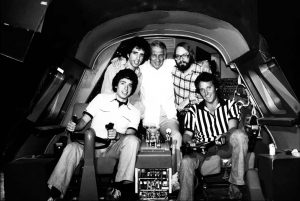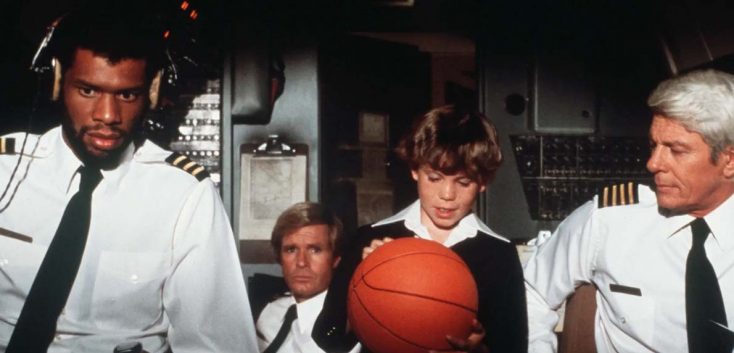
Jerry and David Zucker (left) and Jim Abrahams (far right) are joined in the cockpit by Howard Koch (center) and Jon Davidson. ©Paramount.
By JUDY SLOANE
Front Row Features
HOLLYWOOD-Trans American Airlines, en route to Chicago, has a choice of two entrees for dinner – steak or fish. Unfortunately, the pilot, co-pilot, navigator and half the passengers decide on the fish, which has now led to massive food poisoning. With trepidation, Ted Striker, a war-shattered veteran who ate the steak, enters the cockpit where he is confronted by a grim-faced Dr. Rumack.
Dr. Rumach: Can you fly this plane and land it?
Ted Striker: Surely, you can’t be serious.
Dr. Rumack: I am serious, and please don’t call me Shirley.
Neither man cracks a smile as they earnestly face the dwindling odds of landing the aircraft safely. And that’s exactly what made “Airplane!” such a unique and outrageous experience when it opened in 1980.
Writers/directors/producers Jerry and David Zucker and Jim Abrahams’s masterful decision to place actors known for their dramatic performances into a setting of zany madness, and have them play it straight, turned a little movie into a comic classic.
In 1996, I spoke with Jim Abrahams to find out how he and the Zucker brothers convinced the studio and the actors to trust them.
Judy Sloane: Why did you base “Airplane!” on the movie “Zero Hour?”
Jim Abrahams: It was a 1957 movie that was written by Arthur Hailey, the guy who wrote “Airport,” and it was incredibly melodramatic. We wound up buying the rights to “Zero Hour,” which we put (the dialogue) verbatim in “Airplane!,” ‘We have to find someone who not only can fly the plane, but who didn’t have fish for dinner!’ Can you imagine? You could never find a dumber line than that!
Judy Sloane: Talk about your writing process with the Zuckers.
Jim Abrahams: We’d get to work in the morning and drink coffee and procrastinate, that’s an integral part of writing. We had a video by then of “Zero Hour,” and we would just play it and say, ‘Wouldn’t it be fun in this scene if this happened?’ We went right through it and thought of jokes and gags.
Judy Sloane: Did Paramount worry about the three of you directing the movie?
Jim Abrahams: We said to them, ‘If you want the script of “Airplane!” you have to take us as directors.’ At that time there was no such thing as three people directing a movie, and beside that none of us had directed anything individually either. So we were asking the studio to take a huge leap of faith by trusting us.
Judy Sloane: Your cinematographer, Joseph Biroc, certainly wasn’t new to the business. He did James Stewart’s “It’s a Wonderful Life.” How did he react to all the craziness around him?
Jim Abrahams: He was great. He knew he didn’t quite understand what we were doing, so he would make suggestions all the time, and sometimes we’d take them and sometimes not and he would never be miffed about it. He was elderly and occasionally fell asleep after he’d done lighting a shot, he’d just sit and nod off! We shot the movie in 35 days, so he was obviously very quick.
Judy Sloane: Was it always your intent to cast dramatic actors instead of comedians in it?
Jim Abrahams: That was a leap that we had to get everybody to take with us – basically we didn’t want comedians. Paramount never really understood what we were doing until they started seeing the dailies and then they said, ‘Oh, now I get it.’ It just seemed to us that it would be so much funnier if you got actors who were known for their dramatic work, performing it the way they do their dramatic performance, doing this stupid stuff that could really be funny.
Judy Sloane: Were people like Leslie Nielsen, Robert Stack and Lloyd Bridges surprised to be asked to do such a zany comedy?
Jim Abrahams: I think they were surprised. I think Peter Graves was too.
Judy Sloane: Did you have trouble getting Peter Graves to say, ‘Joey, have you ever seen a naked man before?’ Was he worried about his image?
Jim Abrahams: No, as a matter of fact, it’s so interesting to talk about this all these years later. Just by coincidence, I had been sitting in front of Peter Graves and his wife when they first saw the movie and they were hysterical. His wife, I remember in particular, would be doubled over laughing about as hard as a person can laugh. I think that was his reaction too. I just remember him being a dream [to work with.] I remember all of them being a dream and never questioning [the gags.]
Judy Sloane: I read the actors were not allowed to improvise – is that true?
Jim Abrahams: David, Jerry and I had been working on the script for six years by the time we actually got to film it. We saw the movie clearly in our minds. We just wanted to get exactly what was in the script on the screen.
I remember there was a scene where there’s a mother who’s hysterical, the cliché of the person who cracks under the pressure. There’s a whole bunch of people who slap her, and I think we embellished that a little on the day. Instead of having just one or two people hitting her, we extended the line and we gave people weapons.
Judy Sloane: Was it hard for the actors not to laugh?
Jim Abrahams: They were so professional that was never a problem. They always knew their lines and their performances were always spot on. There was a point when Lloyd Bridges said, ‘My character wouldn’t be saying this now.’ Robert Stack said, ‘Listen Lloyd, nobody is paying attention to what you’re saying, they’re just watching the watermelon fall in the background.’ Robert Stack got it!
Judy Sloane: I noticed that you wrote a part for yourself in the movie – religious zealout #6.
Jim Abrahams: That’s right. I was one of the guys that got punched by Robert Stack. David and Jerry were the two guys who, at the beginning of the movie, direct the airplane into the airport terminal.
Judy Sloane: What is your favorite gag in the movie?
Jim Abrahams: I loved Leslie Nielsen saying, ‘Please don’t call me Shirley.’
Judy Sloane: What were your expectations for the film’s success?
Jim Abrahams: We didn’t know if the movie was going to be a commercial success, but we certainly knew that it was a dream come true and a fantasy for us.
Parts of this article were first published in “Film Review Magazine”





